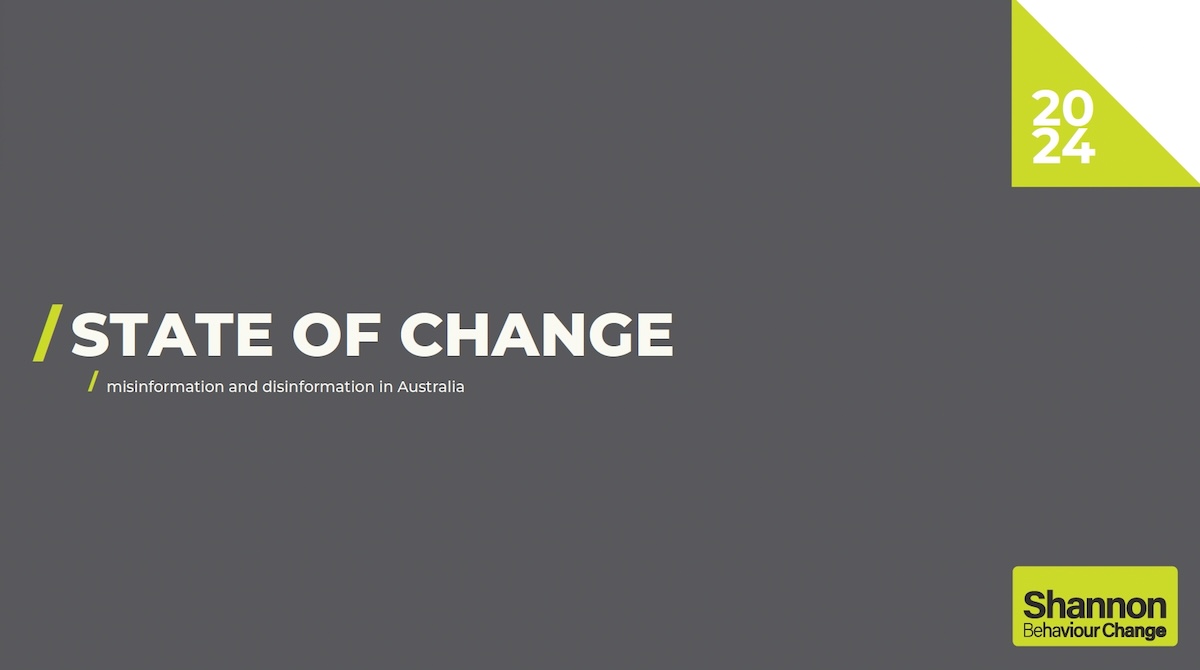Shannon Behaviour Change launches Australia’s First Agency Misinformation Division; unveils new inaugural State of Change 2024 Report

As the wave of misinformation and disinformation continues to shape public opinion and erode trust, Shannon Behaviour Change has launched Australia’s first agency-dedicated Misinformation Team, comprising leading experts in behaviour change. Alongside this launch, the communications consultancy released Australia’s inaugural State of Change 2024 Report revealing the critical need for improved media literacy and stronger regulatory frameworks to tackle the growing issue.
The survey, which polled a thousand Australians nationwide, sheds light on how misinformation is consumed, shared, and combated. The findings underscore the significant role that misinformation plays in shaping opinions, with wide-reaching implications for trust in media, institutions, and democracy itself.
Justine Sywak, director of PR, stakeholder management and misinformation at Shannon Behaviour Change, said the need for this research arose from recognising misinformation’s critical, yet unaddressed, influence across government, corporate and not-for-profit sectors: “The Shannon Behaviour Change 2024 State of Change Report provides an in-depth examination and insights into the growing threat of misinformation and disinformation in Australia, which will be leveraged to assist with implementing best practices, providing tools and strategies for detecting and mitigating misinformation, and supporting public and private sectors in navigating the complexities of this evolving landscape.”
Key findings of the State of Change Report 2024:
- • TV news remains the primary source of news for Australians: Two in five Australians turn to TV media for their news, with one in four relying on social media, and one in five opting for online digital outlets.
- • Misinformation is pervasive: Nearly half of Australians frequently encounter information they suspect is false or misleading.
- • Changing perceptions: More than a quarter of Australians have had to revise their understanding of an issue after discovering the information they believed was false or misleading.
- • Sharing misinformation: Alarmingly, almost half of Australians have shared information that later turned out to be false or misleading. Social media is the primary platform for this, with one in three Australians admitting they’ve shared incorrect information from their own accounts.
- • Public response to misinformation: While one in three Australians check alternate sources when they encounter suspicious information, a worrying third admit they do nothing. However, more than a quarter will actively correct others by identifying misinformation.
- • Confidence in identifying misinformation is low: Less than half of Australians feel confident in their ability to discern whether the news they encounter is true or false.
- • Call for media literacy: In response to these findings, four in five Australians believe that media literacy education is crucial for addressing misinformation and disinformation.
- • Growing concern over misinformation’s societal impact: Three-quarters of Australians express concern about the impact misinformation and disinformation have on Australian society. The same proportion feel that discrediting misinformation is essential, with many agreeing that they bear personal responsibility to verify information before sharing.
- • Trust in democratic institutions is at risk: Four in five Australians believe that misinformation undermines trust in democratic institutions.
- • Ineffectiveness of social media regulation: Three-quarters of Australians believe that social media platforms are failing to effectively regulate misinformation, with nearly the same percentage calling for legislation to combat the issue.

Adds Sywak (pictured above): “The State of Change report outlines the scale, nature, and urgency of misinformation and disinformation in Australia, and we are using it to assess the risks and the strategies required to combat this pervasive issue for our clients.
“The rise of misinformation has reached a critical point. It’s no longer just about fake news stories; it’s about the erosion of trust in media, government, corporate and not-for-profit sectors.
“Our new Misinformation Team will be at the forefront of understanding how Australians interact with misinformation and what strategies we can employ to counteract its effects.”
Shannon Behaviour Change Misinformation Team will work closely with Monash University’s BehaviourWorks Australia – cofoundered by Shannon’s – governments, corporates, not-for-profits, media outlets, and educational institutions to develop evidence-based strategies to combat the spread of false information. The team will also advocate for stronger regulatory frameworks, based on the survey’s findings that a vast majority of Australians feel current efforts by social media platforms are insufficient.
To download your copy of Shannon Behavior Change State of Change 2024 Report go to www.theshannoncompany.com.au/state-of-change/
